Crypto Recap
Jan 12, 2025
Weekly Crypto Recap (Jan 6th - Jan 12th)
Weekly Mindshare Overview
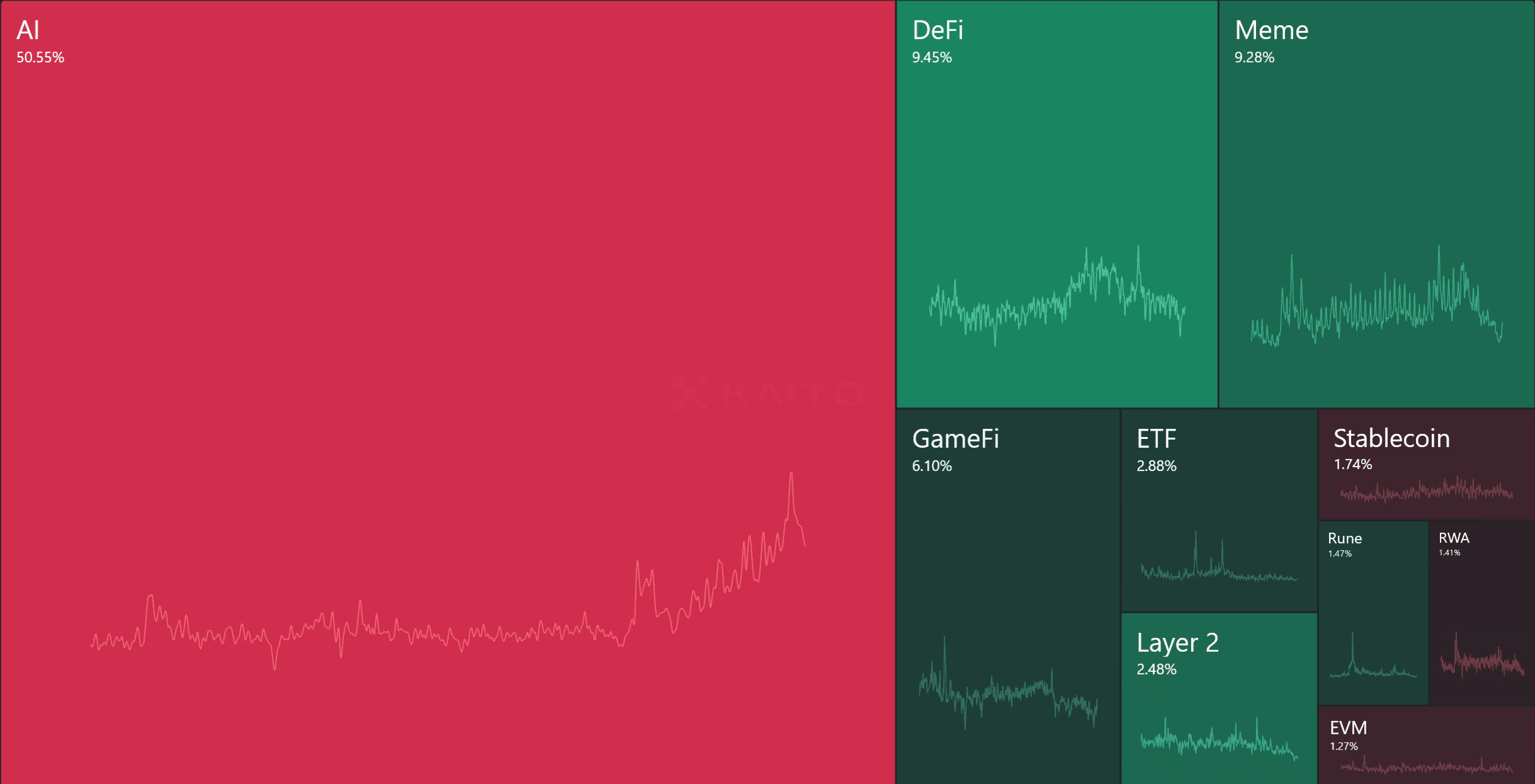
The provided chart showcases a Weekly Crypto Mindshare Overview, highlighting the dominance of discussions and interest across different crypto-related sectors. Here's a breakdown:
- AI (Artificial Intelligence): Commands a massive 50.55% of the overall crypto mindshare, indicating a strong focus on AI-driven projects and narratives.
- DeFi (Decentralized Finance): Accounts for 9.45%, maintaining its place as a key area of interest in the blockchain space.
- Meme Tokens: Garnered 9.28%, suggesting a sustained hype around meme coins and their speculative appeal.
- GameFi (Gaming Finance): Representing 6.10%, emphasizing interest in blockchain gaming and play-to-earn ecosystems.
- ETFs: At 2.88%, showing growing attention to crypto ETFs and institutional entry into the space.
- Stablecoins: With 1.74%, reflecting discussions around regulatory aspects and their role in the ecosystem.
- Layer 2 Solutions: At 2.48%, indicating a focus on scaling Ethereum and other blockchains.
- Rune and RWA (Real World Assets): At 1.47% and 1.41%, respectively, hinting at niche but notable discussions.
- EVM (Ethereum Virtual Machine): At 1.27%, showcasing its ongoing relevance.
The chart reflects the current trends and community focus, with AI clearly dominating the narrative this week. Let me know if you'd like a deeper dive into any of these segments!
Market Trends
Solana Pushes Validators to Test Early Firedancer Upgrade
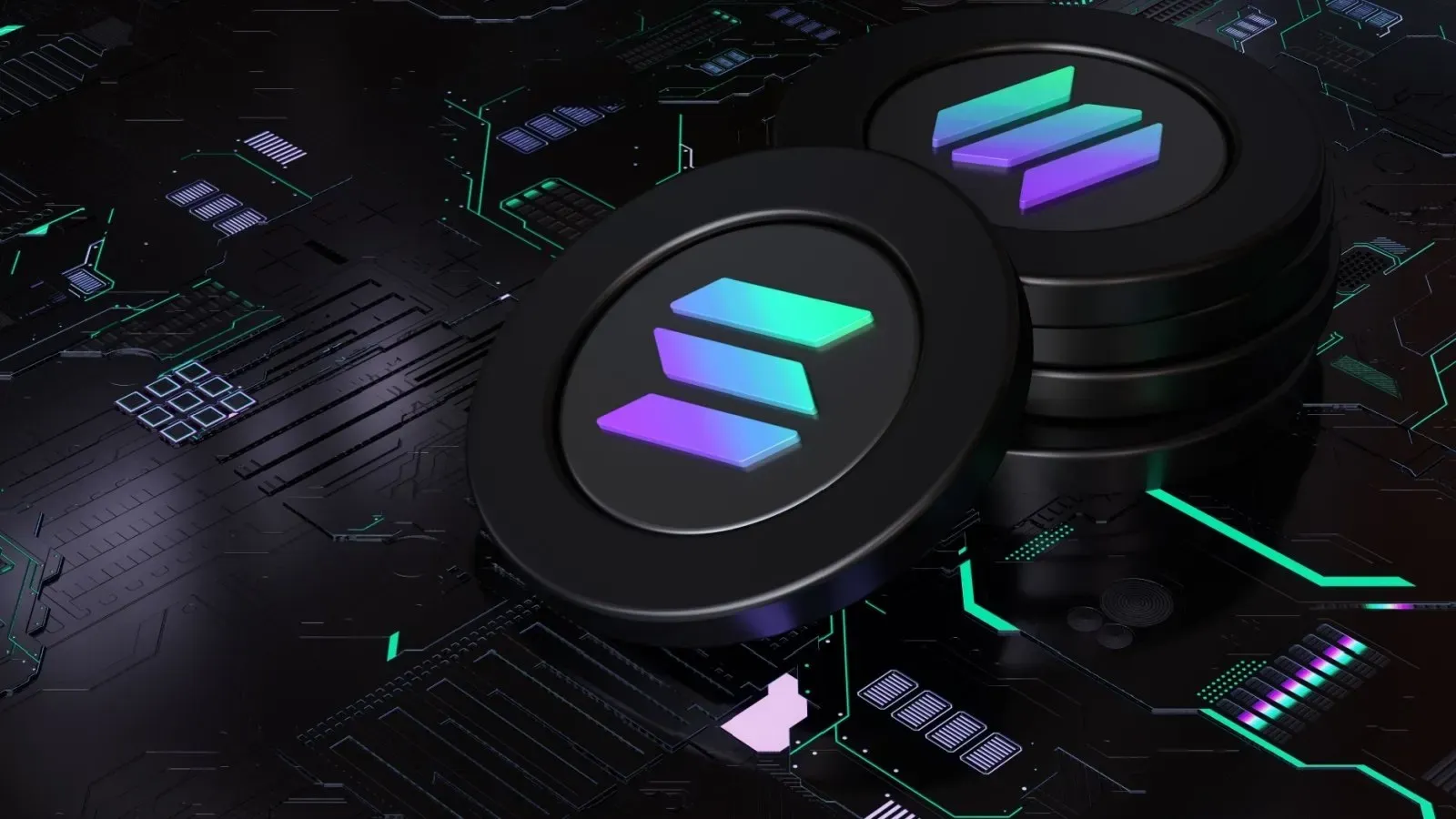
Background
Solana, a blockchain known for its speed and scalability, is testing Firedancer, a new validator client developed by Jump Crypto. This upgrade aims to improve network reliability, reduce outages, and boost transaction throughput.
Key Points
- Firedancer's Role: Designed to enhance performance and decentralization by diversifying Solana’s validator clients.
- Testing Phase: Validators are urged to participate in live testing to ensure smooth deployment and functionality.
- Focus on Stability: The secondary client addresses single-point failure risks, a past issue for Solana.
- Performance Boost: Firedancer has shown impressive results in early demonstrations, supporting Solana’s scalability goals.
Key Takeaway
Firedancer represents a major step forward for Solana's ecosystem, improving stability and scalability. Active validator participation is crucial, as this upgrade could strengthen Solana's position in the blockchain space.
Hyperliquid Responds to Decentralization Criticism
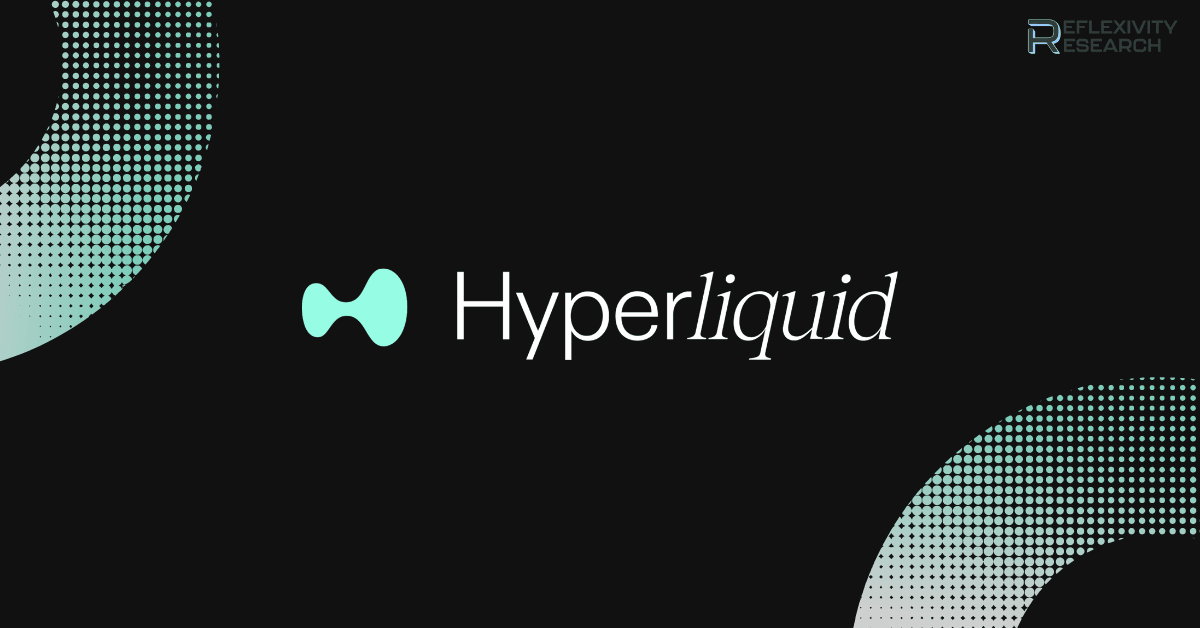
Background
Hyperliquid, a decentralized exchange (DEX) for perpetual swaps, has faced criticism over its decentralization practices. Concerns arose regarding its governance structure and the degree of control retained by its core team. In response, the platform has outlined steps to address these issues and improve transparency.
Key Points
- Centralization Concerns: Critics argue that Hyperliquid’s governance model lacks sufficient community involvement, undermining its decentralized ethos.
- Team's Response: Hyperliquid announced plans to introduce a more inclusive governance framework and empower token holders in decision-making processes.
- Decentralization Roadmap: The exchange is prioritizing long-term decentralization efforts, including deploying smart contracts controlled by the community rather than the core team.
- Performance vs. Decentralization: Hyperliquid defends its design, claiming its performance focus required temporary centralization during its initial growth phase.
Key Takeaway
Hyperliquid's response highlights the delicate balance between performance optimization and decentralization in blockchain projects. The platform's commitment to reform signals its intent to align with the decentralized finance ethos, aiming to rebuild community trust.
Fake OKX Plugins Found in Firefox Browser Store

Background
Fraudulent plugins imitating the crypto exchange OKX were discovered in the Firefox browser’s add-on store. These malicious plugins were designed to steal user credentials and funds, highlighting growing security risks in the crypto space.
Key Points
- Fake Plugins: The plugins impersonated OKX, a leading cryptocurrency exchange, to trick users into sharing sensitive information like private keys and login credentials.
- Malicious Intent: Once installed, the plugins redirected victims to phishing sites or directly captured wallet details.
- Firefox Store Action: Mozilla quickly removed the fake plugins after their discovery, but the incident underscores ongoing vulnerabilities in browser add-on ecosystems.
- User Warning: OKX and security experts have urged users to only download plugins or extensions from official and verified sources.
Key Takeaway
This incident highlights the need for vigilance in the crypto space. Users must verify the authenticity of browser extensions and rely on official sources to prevent falling victim to scams that compromise security and funds.
Decoding Bio Protocol (DeSci's Big Dreams)
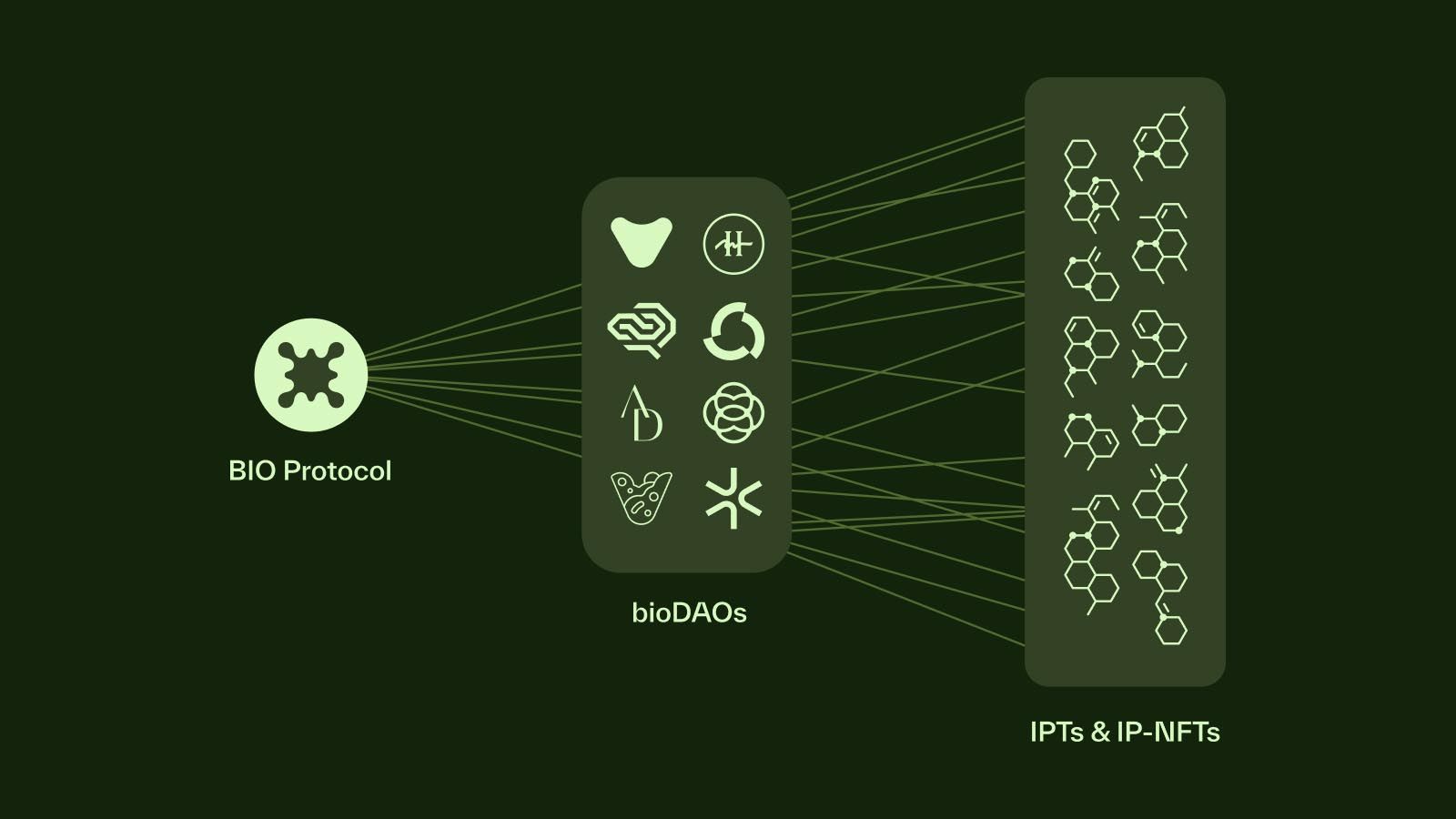
Background
The Bio Protocol is an ambitious project within the Decentralized Science (DeSci) movement, aiming to transform the way scientific research is conducted, funded, and shared. By leveraging blockchain technology, it seeks to create a transparent and collaborative ecosystem for scientific discovery, cutting out traditional intermediaries.
Key Points
- Decentralized Research: Bio Protocol plans to decentralize funding and data ownership in scientific research, allowing researchers direct access to funding and intellectual property rights.
- Focus Areas: The protocol emphasizes open access, ensuring that research data and publications are freely available to the global community.
- Tokenized Incentives: It introduces token-based rewards for researchers and contributors, encouraging collaboration and innovation.
- Challenges Ahead: The project faces hurdles such as adoption within the traditional research community and regulatory compliance in handling sensitive data like genomics.
- Early Support: The initiative is gaining attention from blockchain enthusiasts and institutions interested in open science and decentralized models.
Key Takeaway
Bio Protocol reflects the broader DeSci vision of democratizing science through blockchain, empowering researchers, and breaking down barriers in the traditional scientific ecosystem. While ambitious, its success hinges on adoption by scientists and support from funding bodies.
Coinbase and Polymarket Receive CFTC Subpoenas
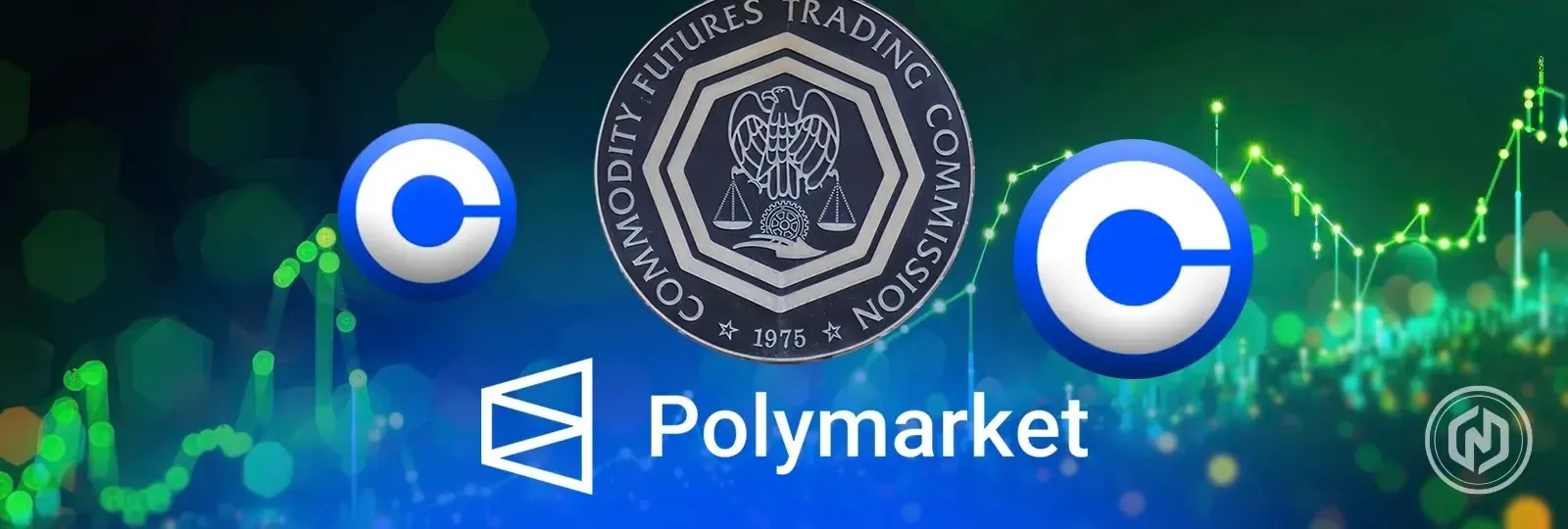
Background
The Commodity Futures Trading Commission (CFTC) has issued subpoenas to Coinbase and Polymarket, signaling increased regulatory scrutiny over crypto platforms. The subpoenas are part of broader efforts to ensure compliance with derivatives trading and market regulations.
Key Points
- Coinbase Inquiry: The CFTC is reportedly investigating whether some of Coinbase’s listed assets or services fall under its jurisdiction, potentially including derivatives or unregistered commodities.
- Polymarket Focus: The decentralized prediction market faces scrutiny for operating without proper registration for certain event-based contracts, which may qualify as derivatives.
- Broader Regulatory Push: The subpoenas reflect heightened CFTC efforts to enforce compliance in the rapidly evolving crypto space, especially concerning derivatives and commodities laws.
- Industry Impact: Increased regulatory focus on major players like Coinbase signals potential changes in how crypto platforms operate, especially around asset classification and compliance.
Key Takeaway
The subpoenas highlight escalating regulatory oversight in the crypto industry, with major platforms like Coinbase and Polymarket under the microscope. These actions could lead to clearer compliance frameworks but may also challenge existing business models.
Ronin Network Partners with Transak for Fiat-to-Crypto NFT Payments

Background
Ronin Network, the blockchain powering Axie Infinity, has partnered with Transak to simplify fiat-to-crypto transactions. The integration aims to enhance accessibility for users entering the NFT ecosystem, particularly those new to crypto.
Key Points
- Simplified Onboarding: The partnership enables users to purchase cryptocurrencies directly with fiat currencies to engage with the Ronin ecosystem and Axie Infinity NFTs.
- Enhanced Accessibility: Transak supports a range of global payment methods, including credit cards, bank transfers, and local wallets, making it easier for users worldwide to participate.
- Boosting NFT Ecosystem: By removing friction in the fiat-to-crypto process, the collaboration is expected to drive growth within Ronin’s NFT and gaming ecosystems.
- Focus on Adoption: The move aligns with Ronin’s goal of attracting mainstream users by streamlining entry points to blockchain gaming and NFTs.
Key Takeaway
Ronin Network’s partnership with Transak is a step toward mainstream adoption of blockchain gaming and NFTs. Simplified fiat-to-crypto conversion could attract a broader audience, reducing barriers for new users to enter the ecosystem.
Fetch.ai Launches $10M Accelerator for AI Agent Startups
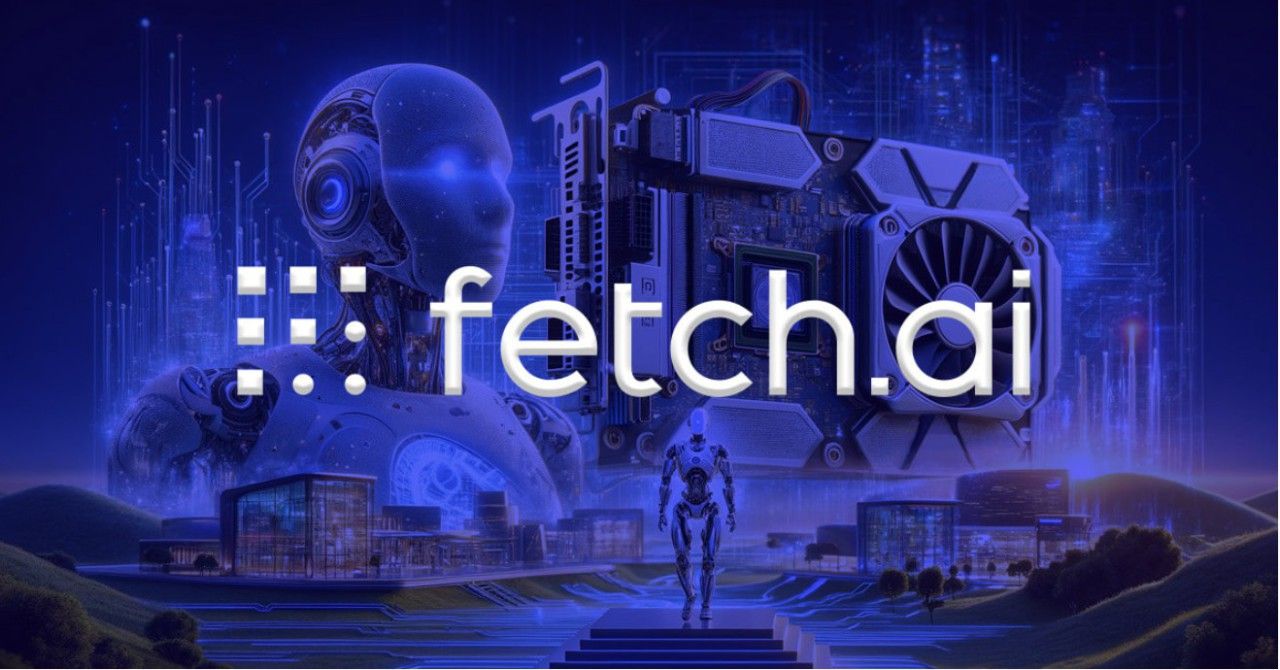
Background
Fetch.ai, a blockchain-powered AI platform, has announced a $10 million accelerator program to support startups developing autonomous AI agents. These agents are designed to streamline tasks in sectors like finance, supply chain, and smart cities using decentralized technologies.
Key Points
- Funding Focus: The accelerator will target early-stage startups building AI-powered decentralized solutions, offering funding, mentorship, and technical support.
- Application Areas: Fetch.ai aims to enhance the adoption of autonomous agents in areas like decentralized finance (DeFi), IoT, and logistics.
- Ecosystem Growth: By fostering innovation, the program seeks to expand Fetch.ai's ecosystem and showcase practical use cases for AI agents on the blockchain.
- Strategic Impact: The initiative reinforces Fetch.ai’s position as a leader in merging AI and blockchain technologies, catering to a rapidly growing market demand.
Key Takeaway
Fetch.ai’s $10M accelerator reflects the growing convergence of AI and blockchain. By supporting startups, Fetch.ai aims to drive innovation and adoption of autonomous AI agents, positioning itself as a key player in decentralized AI solutions.
MANTRA and DAMAC Partner for $1B RWA Tokenization in the Middle East
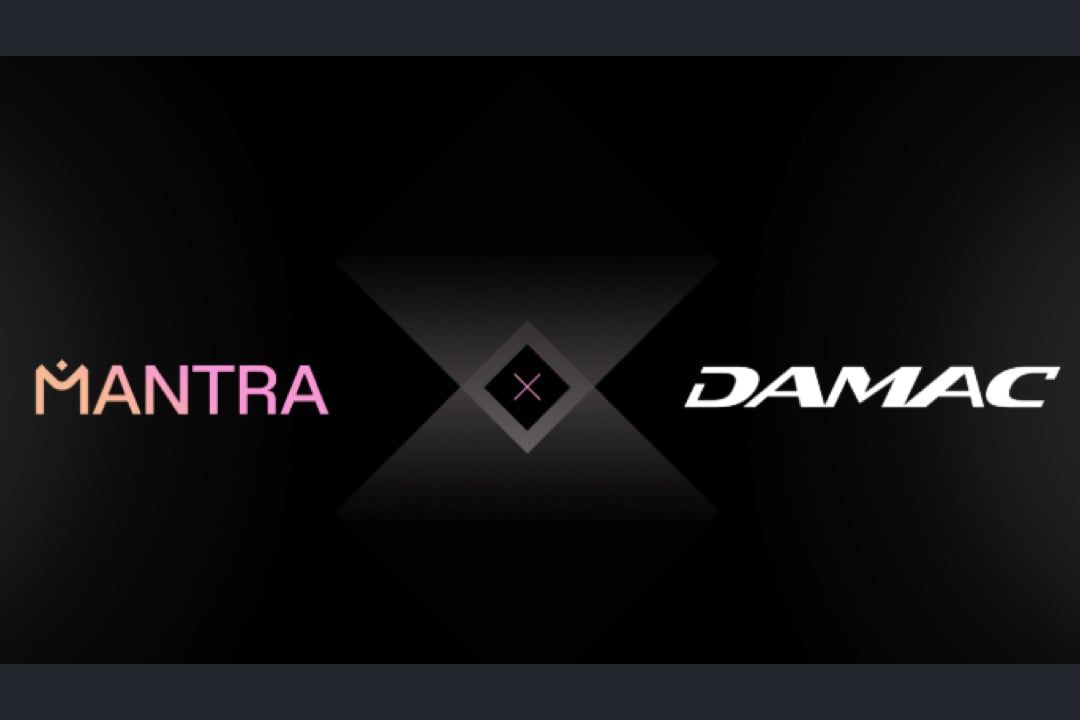
Background
MANTRA, a blockchain ecosystem, has partnered with DAMAC, a leading Middle Eastern real estate developer, to tokenize $1 billion worth of real-world assets (RWA). This initiative aims to revolutionize property investment and accessibility in the region through blockchain technology.
Key Points
- Tokenizing Real Estate: The project will tokenize high-value real estate, allowing fractional ownership and opening up investment opportunities to a global audience.
- Blockchain Advantage: Using blockchain ensures transparency, reduced transaction costs, and easier asset transferability.
- Middle East Expansion: This partnership highlights the region’s growing interest in blockchain adoption for traditional industries like real estate.
- Driving RWA Adoption: By tokenizing RWAs, the collaboration aims to set a precedent for large-scale adoption of blockchain in property markets.
Key Takeaway
The MANTRA-DAMAC partnership is a significant milestone for blockchain in real estate, offering a glimpse into the future of tokenized RWAs. This initiative could attract global investors while cementing the Middle East as a hub for blockchain innovation.
Web3 AI Firm Rena Labs Secures $3.3M in Pre-Seed Funding
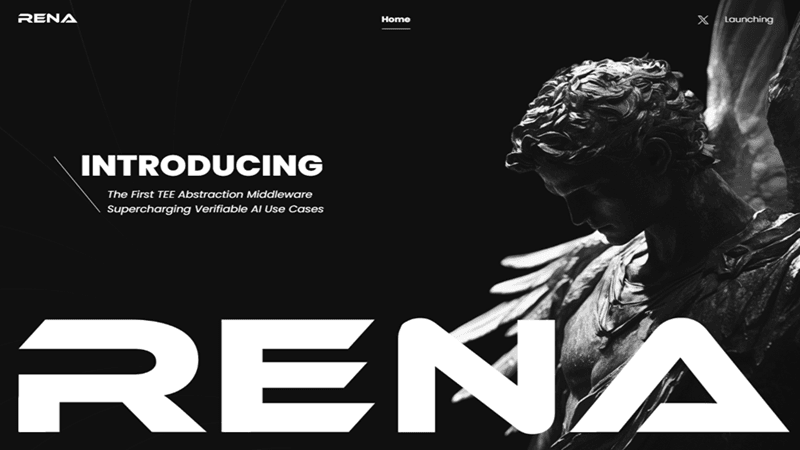
Background
Rena Labs, a startup at the intersection of Web3 and artificial intelligence, has raised $3.3 million in a pre-seed funding round. The funding will be used to build tools that integrate AI with decentralized applications (dApps), aiming to enhance the functionality and user experience of Web3 ecosystems.
Key Points
- Funding Round: The pre-seed round was led by notable investors in the blockchain and AI sectors, signaling strong confidence in Rena Labs' vision.
- AI and Web3 Focus: Rena Labs is developing AI-driven tools to improve automation, decision-making, and interactivity in decentralized applications.
- Ecosystem Impact: The startup’s solutions are expected to enable developers to integrate AI functionalities into dApps, expanding the possibilities of blockchain applications.
- Market Potential: The convergence of AI and Web3 is attracting significant investment, as both technologies promise to reshape industries by fostering innovation and efficiency.
Key Takeaway
Rena Labs’ funding highlights growing investor interest in projects combining AI and Web3. With $3.3M in early backing, the firm is well-positioned to develop groundbreaking tools that could enhance the usability and adoption of decentralized applications.
Circle CEO Donates $1M in USDC to Trump’s Inaugural Committee

Background
Circle CEO Jeremy Allaire disclosed a $1 million USDC donation to Donald Trump’s inaugural committee. This marks a high-profile intersection of cryptocurrency, politics, and corporate influence, raising discussions about blockchain's role in political funding.
Key Points
- Transparent Donation: The donation was made in USDC, a stablecoin issued by Circle, showcasing blockchain’s ability to provide transparency and traceability in political contributions.
- Political Implications: The contribution highlights the increasing role of crypto in political fundraising and its growing acceptance in traditional political landscapes.
- Potential Scrutiny: Such a significant crypto donation may draw regulatory and public attention to the use of digital assets in politics, raising questions about compliance and influence.
- Circle's Strategy: While the donation reflects personal support, it also reinforces Circle's push for mainstream adoption and regulatory dialogue around stablecoins.
Key Takeaway
The $1 million USDC donation underscores the expanding role of crypto in political financing. It raises important discussions about the transparency and regulation of digital assets in political campaigns, potentially setting new precedents for crypto's involvement in governance.
US Solana ETFs Unlikely to Be Approved Soon
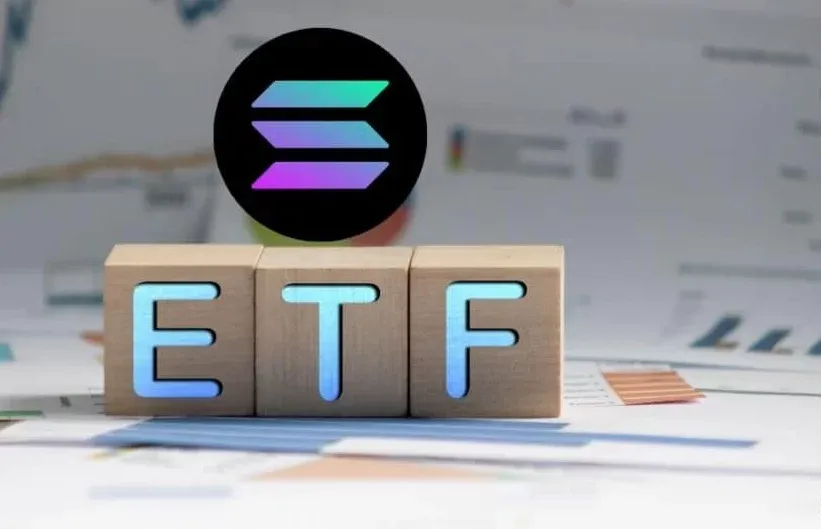
Background
The prospects of U.S. approval for Solana-based exchange-traded funds (ETFs) remain slim due to ongoing regulatory challenges. Despite growing interest in crypto ETFs, Solana-focused products face significant hurdles compared to Bitcoin and Ethereum ETFs.
Key Points
- Regulatory Roadblocks: The SEC's cautious stance on crypto ETFs has delayed approvals, with a particular focus on lesser-established assets like Solana.
- Market Interest: Solana’s growing ecosystem and scalability have attracted interest from institutional players, but regulatory clarity remains a major barrier.
- Focus on Major Cryptos: Bitcoin and Ethereum ETFs are prioritized by regulators due to their longer histories and perceived stability.
- Broader Implications: Delays in Solana ETF approvals reflect the challenges of integrating altcoins into traditional financial products amid regulatory uncertainties.
Key Takeaway
While interest in Solana-based ETFs grows, regulatory hurdles keep approval timelines uncertain. This highlights the need for clearer frameworks to support broader adoption of altcoin-focused investment products.
THORChain Announces Executive Restructuring
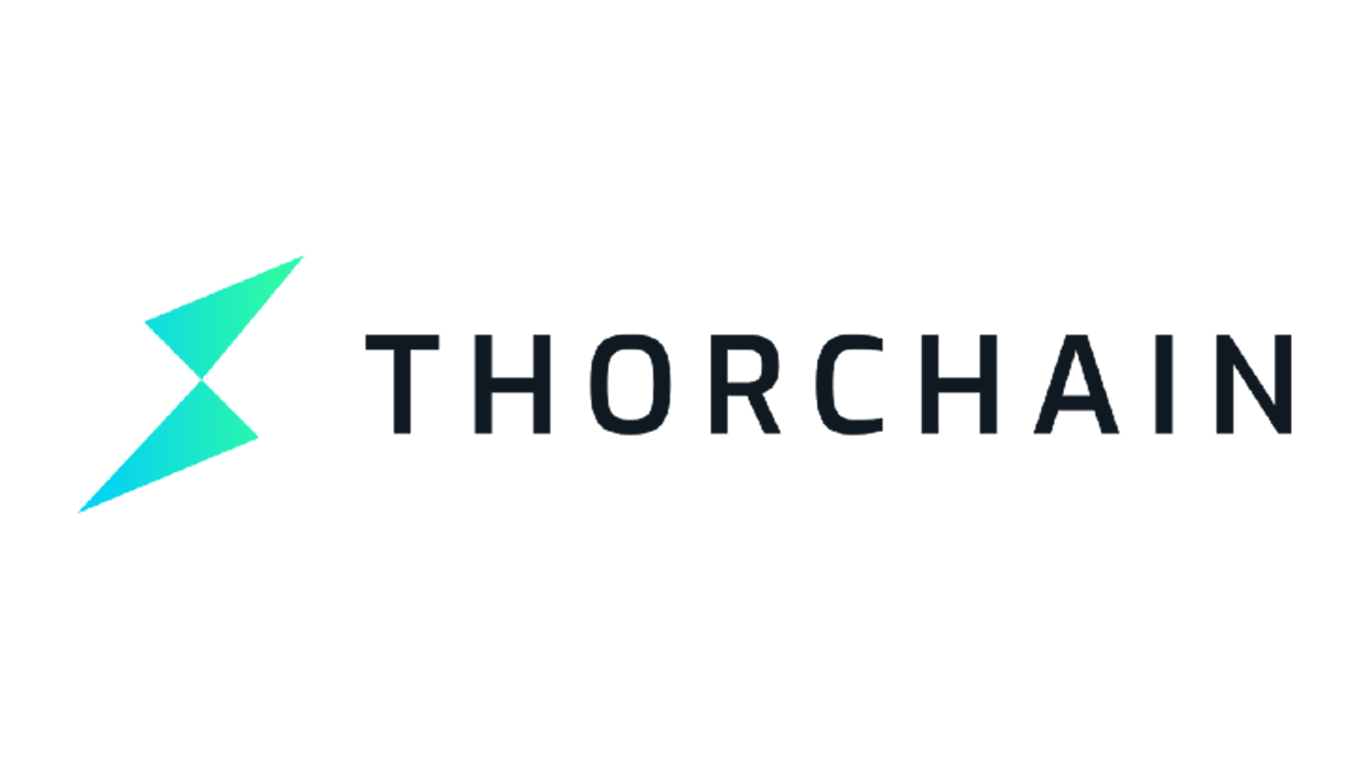
Background
THORChain, a decentralized liquidity protocol, has announced a major executive restructuring to strengthen its leadership and adapt to the evolving DeFi landscape. The changes aim to improve governance, operational efficiency, and long-term sustainability.
Key Points
- Leadership Changes: Key executive roles have been reorganized to better align with THORChain’s growth and strategic goals. Details on the new leadership structure emphasize experience in DeFi and blockchain.
- Focus on Governance: The restructuring includes a commitment to enhancing community-driven governance, reflecting THORChain’s decentralized ethos.
- Operational Streamlining: Efforts will focus on optimizing the protocol’s efficiency, addressing scalability challenges, and strengthening risk management practices.
- Future Vision: The new structure aims to position THORChain as a leader in cross-chain DeFi solutions, with plans to expand its liquidity offerings and enhance user experience.
Key Takeaway
THORChain’s executive restructuring underscores its commitment to adaptability and growth. By refining governance and leadership, the protocol aims to cement its position as a key player in decentralized finance.
Exodus Wallet Becomes First Crypto Wallet to List on NYSE American
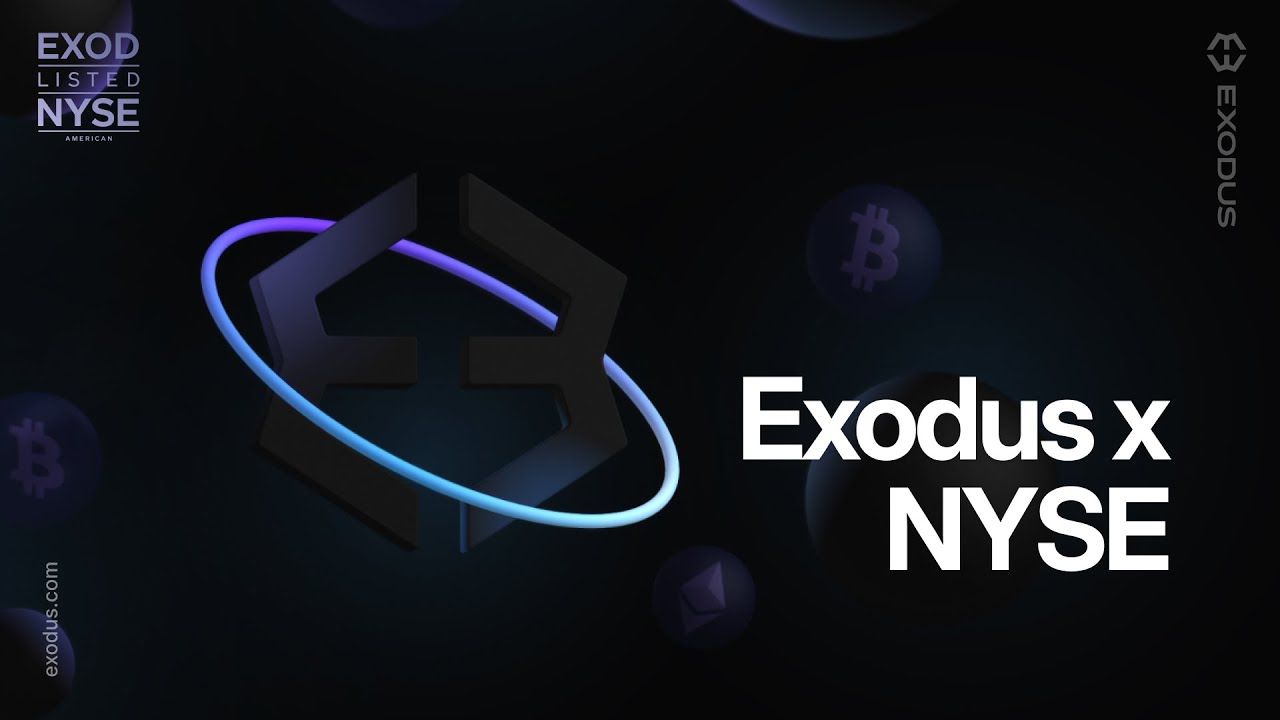
Background
Exodus, a non-custodial cryptocurrency wallet, has made history by becoming the first crypto wallet to be publicly listed on the NYSE American exchange. This milestone highlights the growing integration of crypto-focused companies into traditional financial markets.
Key Points
- Public Listing: Exodus debuted under the ticker symbol EXOD, representing a significant step for crypto-native businesses entering regulated stock markets.
- User-Centric Model: As a non-custodial wallet, Exodus empowers users with full control over their assets, distinguishing itself in the competitive crypto space.
- Market Position: The listing is expected to bolster Exodus’s credibility and expand its reach, appealing to both retail and institutional investors.
- Broader Implications: This move highlights increasing acceptance of crypto-related companies in traditional financial ecosystems, bridging the gap between TradFi and blockchain technology.
Key Takeaway
Exodus’s NYSE American debut sets a precedent for crypto companies aiming to tap into traditional financial markets. This achievement reflects growing investor confidence in blockchain technologies and their potential for mainstream adoption.
Eliza Labs and OriginTrail Launch DKG Plugin for AI Agents
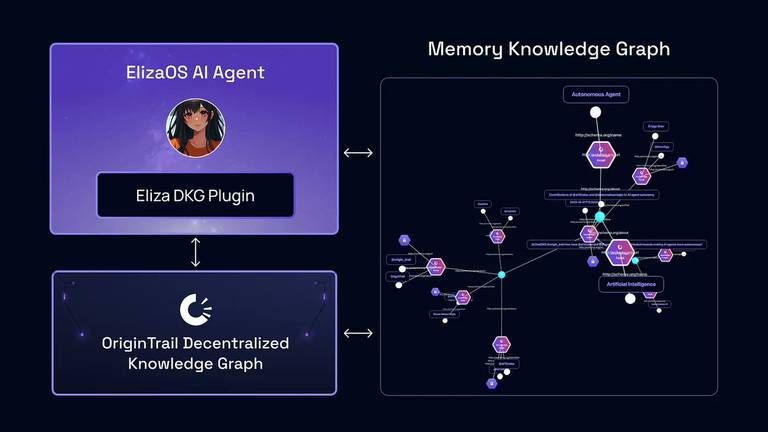
Background
Eliza Labs, in collaboration with OriginTrail, has launched a Decentralized Knowledge Graph (DKG) plugin designed to enhance AI agents’ memory and collective intelligence. The integration aims to improve how AI systems interact with decentralized data.
Key Points
- DKG Plugin: The plugin enables AI agents to access and process decentralized, verifiable data through the OriginTrail DKG, enhancing their ability to handle complex tasks.
- Improved Memory: By integrating the DKG, AI agents gain persistent memory capabilities, allowing them to retain and build upon prior interactions.
- Collaboration Benefits: The solution bridges decentralized technologies with advanced AI, offering new opportunities for applications in supply chain management, research, and Web3 infrastructure.
- Future of AI: The partnership highlights how blockchain-powered decentralized data networks can empower AI systems to become more reliable and transparent.
Key Takeaway
The Eliza Labs-OriginTrail DKG plugin represents a significant step toward integrating AI and blockchain. By enhancing AI agents’ memory and data capabilities, this innovation sets the stage for more advanced, decentralized AI applications in Web3 and beyond.
Raydium Protocol Launches Beta Perpetual Futures Trading
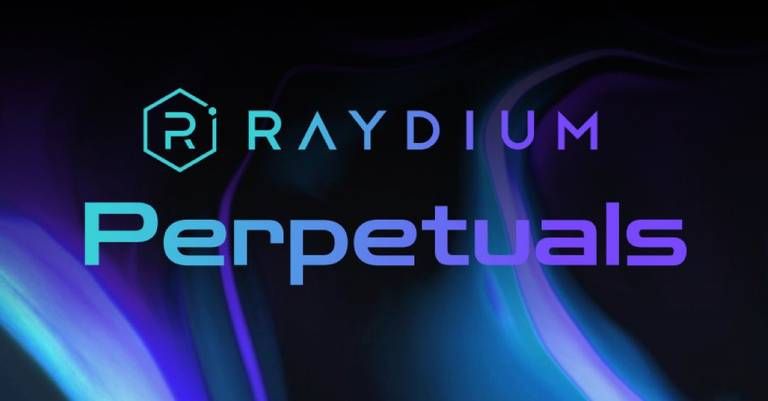
Background
Raydium, a leading decentralized exchange (DEX) on Solana, has launched a beta perpetual futures trading platform. This new offering allows users to trade with up to 40x leverage while benefiting from Solana’s low-cost, high-speed infrastructure.
Key Points
- Perpetual Futures: The beta platform enables leveraged trading of perpetual futures, appealing to experienced traders seeking advanced tools in DeFi.
- Gas-Free Trading: Leveraging Solana’s network, the platform eliminates gas fees, reducing barriers for high-frequency and leveraged trading.
- High Leverage: Offering up to 40x leverage positions Raydium as a competitor to centralized platforms, combining CEX-like features with DeFi’s transparency.
- User Safety: Raydium includes safeguards and liquidation mechanisms to minimize risks for traders engaging with high-leverage tools.
Key Takeaway
Raydium’s foray into perpetual futures trading highlights DeFi’s evolution toward offering advanced trading products. With its gas-free and high-leverage features, Raydium seeks to attract a broader range of traders while showcasing Solana’s capabilities in supporting next-gen financial products.
Arbitrum DAO Opens Vote on BOLD Protocol Proposal
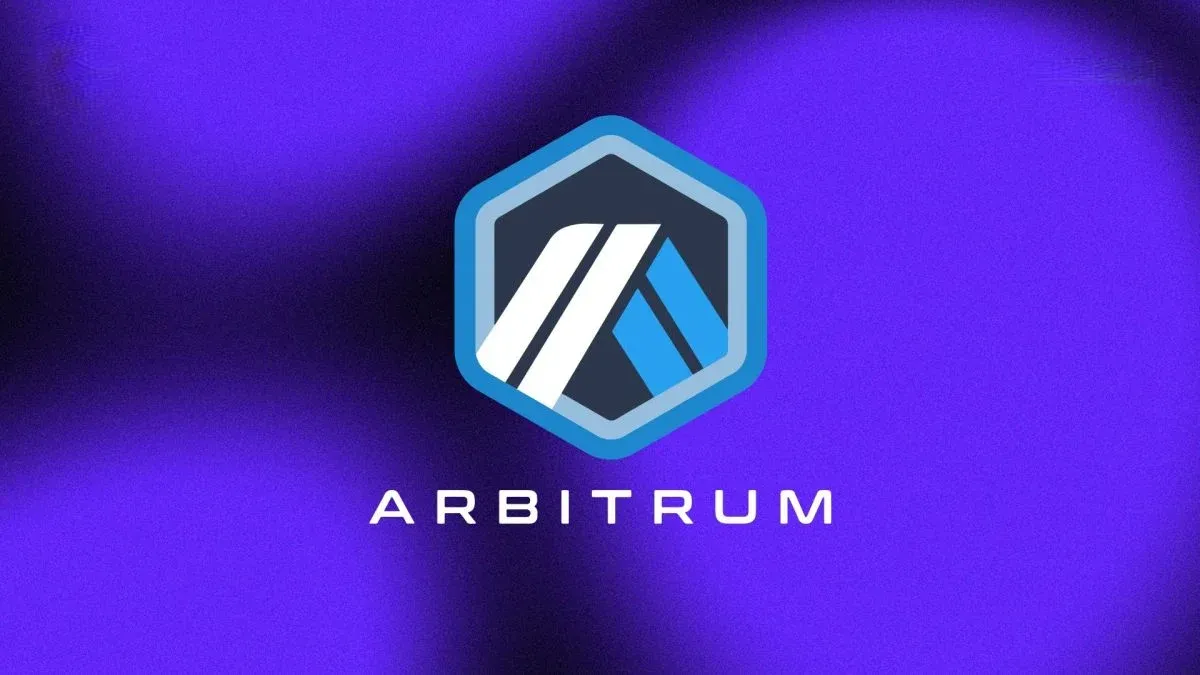
Background
Arbitrum DAO has initiated a vote on a proposal to implement the BOLD (Bounded Liquidity Delay) protocol, a mechanism designed to enhance governance and improve the transparency of on-chain treasury operations.
Key Points
- BOLD Protocol Goals: The protocol aims to add a time delay to large treasury transactions, giving DAO members adequate time to review and react to proposed allocations.
- Governance Improvements: BOLD introduces safeguards against sudden, large-scale changes, ensuring a more democratic and participatory governance process.
- Voting Process: Arbitrum DAO members are encouraged to vote on the proposal, which, if approved, would set a precedent for governance practices in decentralized organizations.
- Ecosystem Impact: Adoption of BOLD could strengthen community trust in Arbitrum’s governance and serve as a model for other DAOs managing substantial treasuries.
Key Takeaway
The BOLD protocol vote underscores Arbitrum DAO’s commitment to improving governance transparency and accountability. If implemented, it could enhance the DAO’s operational integrity and set new standards for decentralized treasury management.
Usual Protocol Faces USD0 De-Peg Incident
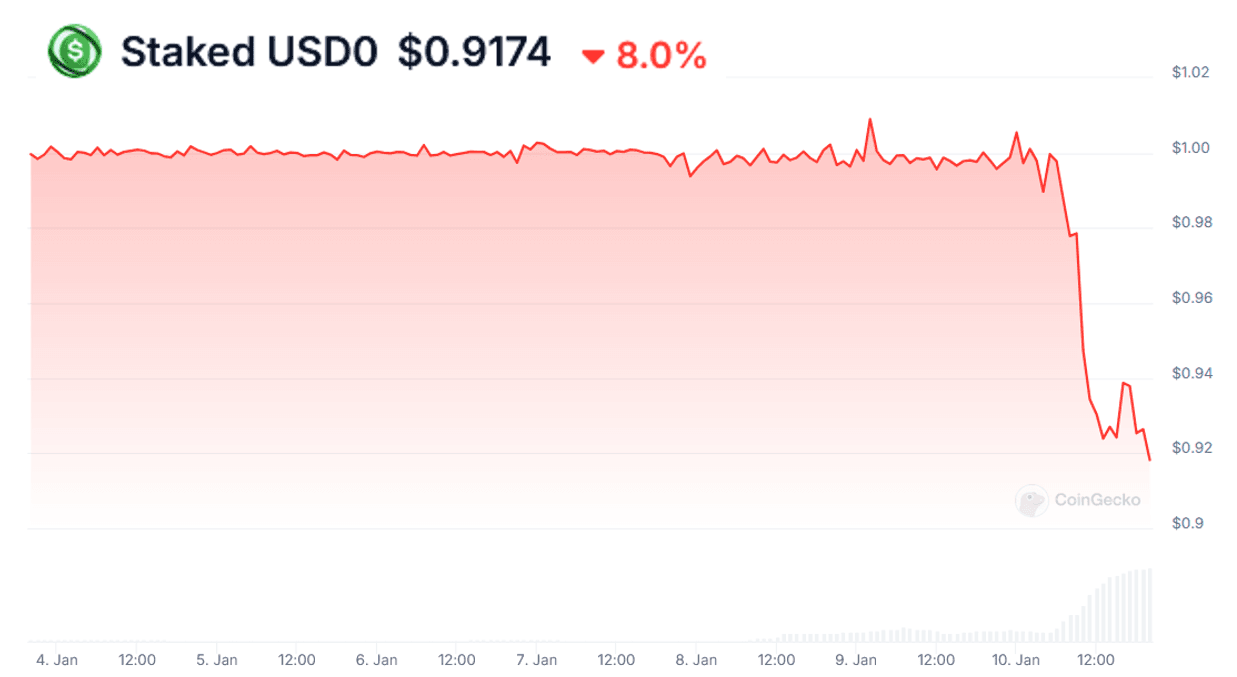
Background
Usual Protocol, known for its decentralized stablecoin USD0, recently experienced a de-pegging event where USD0 briefly lost its 1:1 parity with the US dollar. This incident raised questions about the stability of decentralized stablecoins in volatile markets.
Key Points
- De-Peg Event: USD0’s value dropped to $0.99 following a significant sell-off by a large holder, causing a temporary deviation from its intended peg.
- Recovery Mechanism: The protocol’s design facilitated a swift return to the $1 peg, with the price stabilizing shortly after the initial drop.
- Collateralization: USD0 is fully backed by real-world assets, ensuring stability and mitigating risks associated with de-pegging events.
- Protocol Resilience: Despite the de-peg, Usual Protocol’s mechanisms worked as intended, restoring stability and maintaining user confidence.
Key Takeaway
The brief de-pegging of USD0 highlights challenges faced by decentralized stablecoins but also showcases Usual Protocol’s robust design and recovery mechanisms, ensuring long-term trust in its ecosystem.
Hyperfy Launches Virtual Abundance Platform
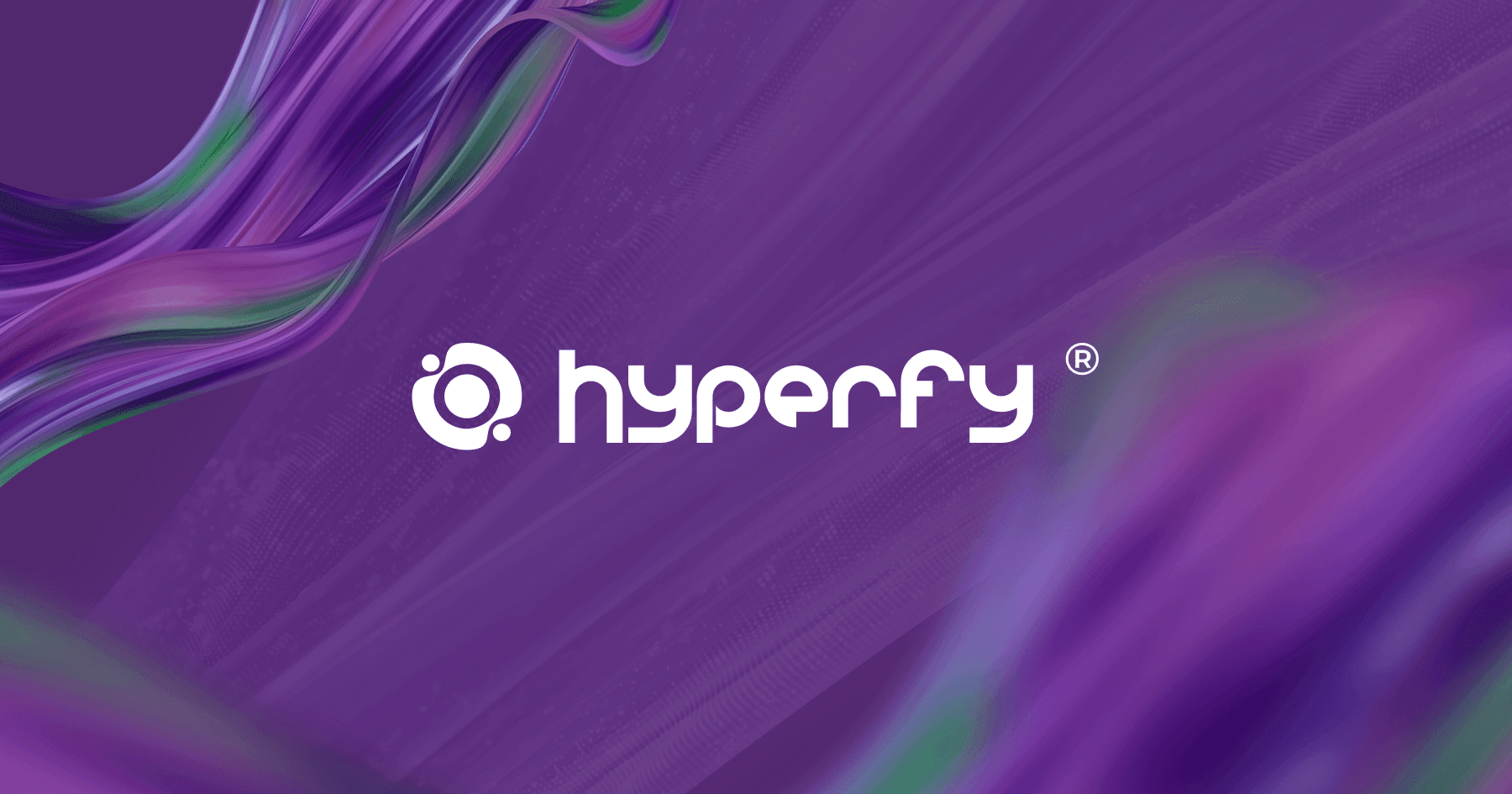
Background
Hyperfy, a metaverse platform focused on user-generated virtual worlds, has introduced the Virtual Abundance Platform, aiming to empower creators and communities to monetize and enhance their digital experiences. This new initiative underscores the potential of decentralized metaverses in fostering economic opportunities.
Key Points
- Creator-Centric: The platform provides tools for creators to design and monetize virtual spaces, including NFT integration and microtransactions.
- Community Ownership: Leveraging blockchain technology, Hyperfy enables users to maintain ownership of their virtual assets and worlds, ensuring decentralized control.
- Scalable Ecosystem: The platform supports interoperability, allowing users to bring assets and experiences across various blockchain ecosystems.
- Economic Opportunities: By facilitating a user-driven economy, Hyperfy aims to redefine digital ownership and incentivize participation in the metaverse.
Key Takeaway
Hyperfy’s Virtual Abundance Platform exemplifies the potential of decentralized metaverses to enable economic empowerment for creators and communities. This launch highlights the growing shift toward user-centric virtual environments with real-world value.
Fundraising Highlights
1. Oh
- Amount Raised: $4.5M
- Stage: Seed
- Lead Investors: Big Brain Holdings, Kosmos Ventures, Bodhi Ventures
- Focus: A Web3 AI platform developing tools like OhChat for AI-driven character interactions, APIs for AI integrations, and generative AI models using blockchain governance.
2. SEED Combinator
- Stage: Strategic
- Lead Investor: Sui Foundation
- Focus: An incubator for Web3 startups, specializing in Telegram-based mini-apps and advisory services.
3. OG Labs
- Amount Raised: $32.24M
- Stage: Public Token Sale
- Focus: Developer tooling provider focused on data availability infrastructure for scalable and secure Web3 applications.
4. Derive
- Stage: Strategic
- Lead Investor: Maelstrom
- Focus: A decentralized protocol for trading derivatives like options and perpetuals on an Optimistic Rollup.
5. Alpen Labs
- Amount Raised: $8.5M
- Stage: Strategic
- Lead Investors: Mirana Ventures, Castle Island Ventures, Ribbit Capital
- Focus: Building ZK-based scaling solutions for Bitcoin, including payment protocols and privacy-enhancing applications.
6. Nevermined
- Amount Raised: $4.0M
- Stage: Extended Seed
- Lead Investors: Arca, Polymorphic Capital, NEAR Protocol
- Focus: Provides developer tools for NFTs, data marketplaces, and DAO governance in Web3 applications.
7. Rena Labs
- Amount Raised: $3.3M
- Stage: Pre-Seed
- Lead Investors: Eterna Capital, Selini Capital, Mapleblock Capital
- Focus: AI security infrastructure enabling trusted on-chain execution environments and privacy-centric digital interactions.
8. Superseed
- Amount Raised: $4.47M
- Stage: Public Token Sale
- Focus: A decentralized protocol for creating and managing on-chain investment pools, democratizing access to blockchain investments.
This summary showcases diverse projects across AI, Web3, DeFi, and blockchain scaling solutions, reflecting strong investor confidence in innovation-driven sectors.